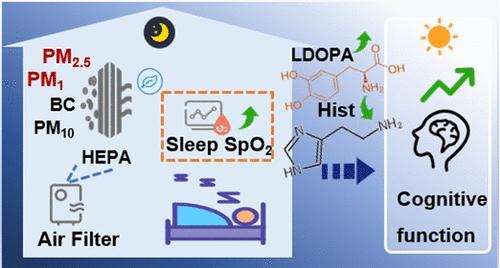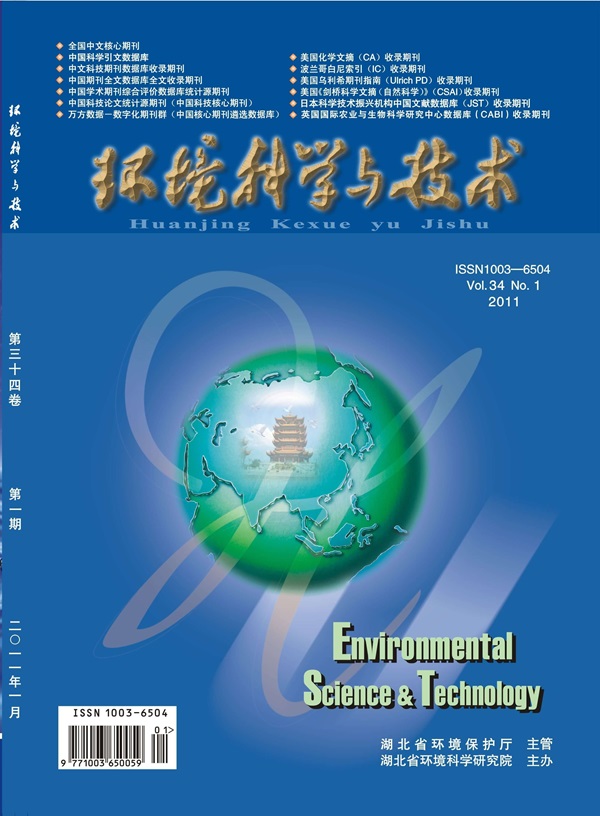Cognitive Benefits of Reducing Indoor Particulate Matter Exposure During Sleep: New Evidence from a Randomized, Double-blind Crossover Trial
IF 10.8
1区 环境科学与生态学
Q1 ENGINEERING, ENVIRONMENTAL
引用次数: 0
Abstract
There is increasing evidence that particulate matter (PM) pollution may adversely impact cognition. Considering that sleep is critical for cognitive health and occupies about one-third of human life, understanding the cognitive effects of indoor PM exposure during sleep and the potential cognitive benefits of reducing such exposure is crucial, yet currently unknown. This randomized, double-blind crossover intervention trial was conducted among 80 college students with real and sham PM filtration in their dormitories. Real-time indoor PM levels and nocturnal sleep parameters were monitored, followed by quantification of serum neurotransmitter metabolites and cognitive assessments in the mornings. We found that PM exposure during sleep, particularly PM1 and PM2.5, affected immediate and delayed memory, executive function, and global cognition. Reducing PM exposure during sleep resulted in improvements in multiple cognitive domains, with a 0.21 (95% CI: 0.05, 0.36) increase in global cognitive z-score, in which increased sleep oxygen saturation (SpO2) and alterations in dopamine metabolism and histidine metabolism played important roles. Notably, even when indoor PM2.5 levels were below the WHO air quality guidelines, further reducing PM exposure could still improve sleep SpO2 and neurotransmitter metabolism. This study provides a promising strategy to mitigate indoor PM-induced cognitive impairment.

减少睡眠期间室内微粒物质暴露对认知的益处:来自随机双盲交叉试验的新证据
越来越多的证据表明,颗粒物(PM)污染可能会对认知能力产生不利影响。考虑到睡眠对认知健康至关重要,而且睡眠时间约占人类生命的三分之一,因此了解睡眠期间接触室内可吸入颗粒物对认知的影响以及减少这种接触对认知的潜在益处至关重要,但目前尚不清楚。这项随机、双盲交叉干预试验在 80 名大学生中进行,他们的宿舍分别安装了真实和虚假的可吸入颗粒物过滤装置。对室内可吸入颗粒物水平和夜间睡眠参数进行了实时监测,随后对血清神经递质代谢物进行了量化,并在早晨进行了认知评估。我们发现,睡眠期间暴露于可吸入颗粒物,尤其是 PM1 和 PM2.5,会影响即时和延迟记忆、执行功能和整体认知。减少睡眠中的可吸入颗粒物暴露可改善多个认知领域,全球认知Z值增加了0.21(95% CI:0.05,0.36),其中睡眠氧饱和度(SpO2)的增加以及多巴胺代谢和组氨酸代谢的改变发挥了重要作用。值得注意的是,即使室内PM2.5水平低于世界卫生组织的空气质量指南,进一步减少PM暴露仍能改善睡眠SpO2和神经递质代谢。这项研究为减轻室内可吸入颗粒物引起的认知障碍提供了一种有前景的策略。
本文章由计算机程序翻译,如有差异,请以英文原文为准。
求助全文
约1分钟内获得全文
求助全文
来源期刊

环境科学与技术
环境科学-工程:环境
CiteScore
17.50
自引率
9.60%
发文量
12359
审稿时长
2.8 months
期刊介绍:
Environmental Science & Technology (ES&T) is a co-sponsored academic and technical magazine by the Hubei Provincial Environmental Protection Bureau and the Hubei Provincial Academy of Environmental Sciences.
Environmental Science & Technology (ES&T) holds the status of Chinese core journals, scientific papers source journals of China, Chinese Science Citation Database source journals, and Chinese Academic Journal Comprehensive Evaluation Database source journals. This publication focuses on the academic field of environmental protection, featuring articles related to environmental protection and technical advancements.
 求助内容:
求助内容: 应助结果提醒方式:
应助结果提醒方式:


